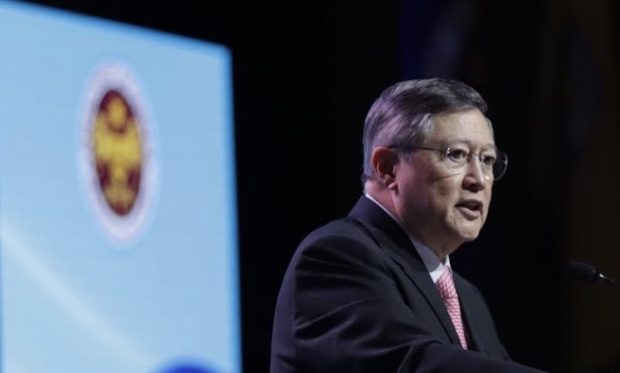
Finance Secretary Carlos G. Dominguez III. Photo from DOF
MANILA, Philippines — Good news for government employees.
President Rodrigo Duterte’s push to further raise salaries of civil servants, including teachers and nurses, under a fifth round of the Salary Standardization Law (SSL) would be implemented sooner than later.
Finance Secretary Carlos Dominguez III said on Tuesday that the government had ample resources to finance the new round of salary increases.
“We normally wait three to four years before moving to SSL 5. However, the President decided to propose the SSL. We have done the numbers … and we can afford it,” Dominguez said in an interview at the Department of Finance (DOF).
In his fourth State of the Nation address on Monday, the President said it was time for Congress to approve a new version of the SSL.
The President mentioned public school teachers who, he said, “toil and work tirelessly to educate our young,” and nurses as among those who would receive a pay increase.
A bit bigger than before
The increase is not really big, but “it will tide you over during these hard times. A little bit bigger than before,” the President said.
Public school teachers have accused the President of reneging on his campaign promise to increase their pay.
At a protest rally in Quezon City not far from the Batasang Pambansa Complex where the President delivered his speech, educators demanded a base pay of P30,000 for teachers, P31,000 for instructors, and P16,000 for rank-and-file government workers.
Dominguez said the acting head of the Department of Budget and Management (DBM) had already come up with the initial estimate on the cost of the salary increase for government personnel.
Affordable
The amount is “well-within” what the government can afford, the finance chief said. He did not give the exact figure.
The proposed SSL 5 was already filed as a bill in the 18th Congress, Dominguez said, unlike the fourth SSL which was implemented under Executive Order No. 201 issued by then President Benigno Aquino III in 2016.
The Aquino administration lacked the time to enact the salary adjustments into law as the measure came too close to the national elections in 2016.
But Dominguez noted that a law could not be reversed, unlike an EO.
He said the DOF and DBM had yet to determine if the proposed SSL 5 could be implemented next year.
The fourth installment of salary increases under SSL 4 was implemented this year, though later than usual due to the delayed passage of the P3.7-trillion 2019 national budget because of squabbles in Congress.
Former Budget Secretary Benjamin Diokno, now Bangko Sentral ng Pilipinas governor, earlier said the fourth round of salary increases could not be implemented under the reenacted 2018 budget.
But in March, the DBM’s officer in charge, Janet B. Abuel, issued Circular Letter No. 2019-7A, which identified the source of funds from the reenacted budget to cover personnel expenses in the second quarter while this year’s appropriations remained unapproved at that time.
As for the President’s proposal to create three new departments—for disaster resilience, overseas Filipinos and water resources—and the Water Regulatory Commission, Dominguez said: “We fully support the initiatives of the President to improve services to the OFWs [overseas Filipino workers], to properly manage our water resources and to prepare for natural disasters.”
While he does not know yet the exact cost needed to establish these departments, Dominguez said it would likely be “not very high … maybe 10 percent more” than the costs to maintain existing related agencies.
Already existing
He said the new units would just come from existing agencies whose “focus and leadership” would be expanded.
In the case of OFWs, the Overseas Workers Welfare Administration and the Philippine Overseas Employment Agency already exist.
As for for water, the Local Water Utilities Administration and the National Water Resources Board are operating, and for disaster resilience, there is Office of Civil Defense, Dominguez pointed out.
“The bulk [of the organizations] are already existing. You just reorganize them and call them something else,” he said.